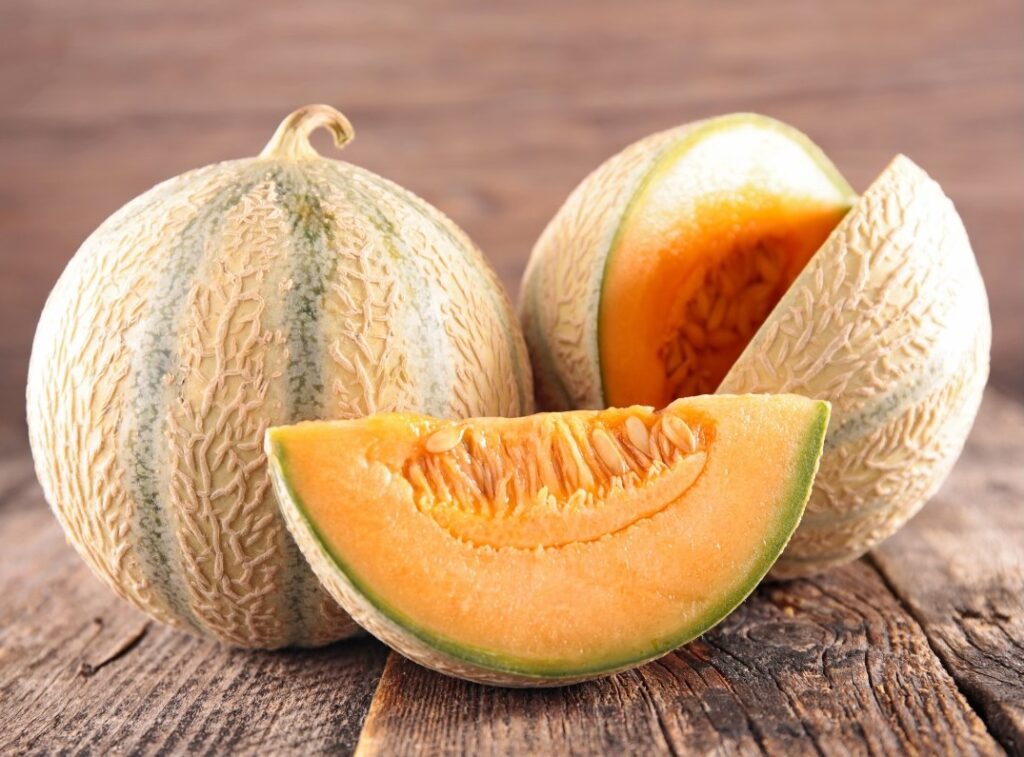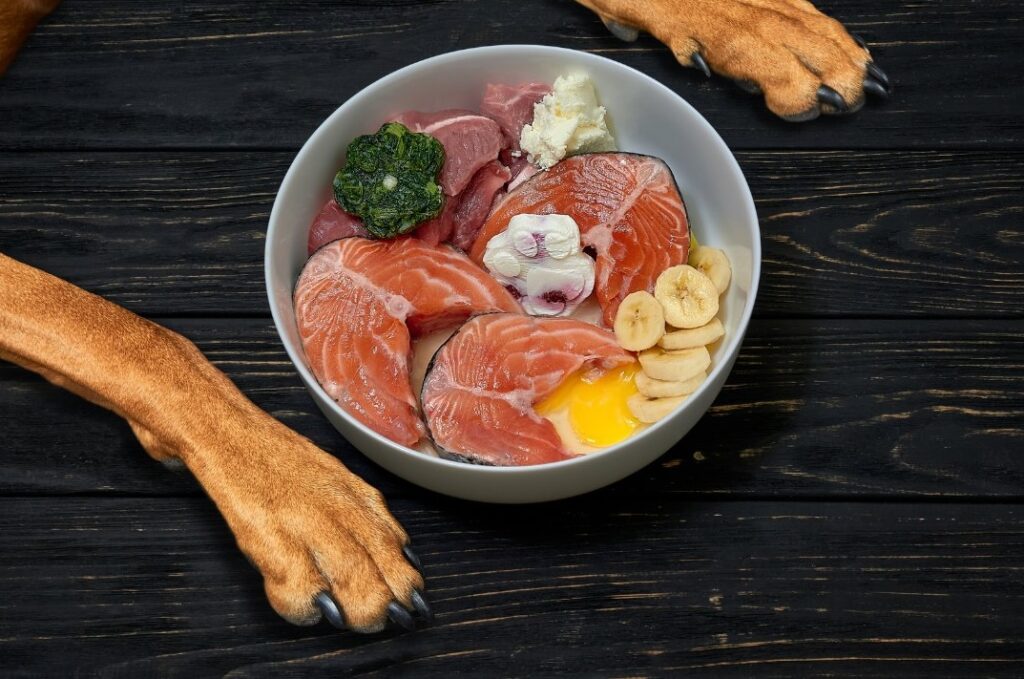Although dogs are known to be meat-eaters, a variety of fruits for dogs can provide them with an excellent source of essential vitamins, antioxidants, nutrients, and hydration. The natural sugars and fibres in fruits can aid digestion and promote overall health. With a balanced diet that includes fruits, dogs can enjoy a healthier, more vibrant life.
Transform snack time into an engaging and exciting challenge by exploring creative ways to incorporate these nutritious treats into your training and playtime activities! Fruit can be added to Kongs and Likimats, along with meat-based products, to provide mental stimulation through a variety of smells and tastes.
What Fruit Can Dogs Eat?
Most dogs enjoy fruit, it makes a great treat and can be used for enrichment.
Dogs have a different digestive system than humans, which makes them prone to long-term health issues if they consume inappropriate foods. In some severe cases, it may even cause death.
As dogs are omnivores, they don’t necessarily require fruits and vegetables in their diet. However, feeding them dog-safe fruits and vegetables as occasional treats is acceptable.

Fruits for dogs: Introducing New Foods
With any new food introduction, you should go slowly to ensure your dog tolerates the food and does not experience any gastrointestinal upset or allergic reactions. Introduce one type of fruit at a time, just a piece or two a day, to see how your dog reacts.
🍏 Apples (without seeds) are a crunchy treat rich in vitamins A and C, as well as fibre. Just be sure to remove the core and seeds before serving.
🍌 Bananas: Full of potassium, vitamins, biotin, fibre, and copper. They are low in cholesterol and sodium, but remember, due to the high sugar content, bananas should be given as a treat, not as part of your dog’s diet.
🍓 Berries (strawberries, blueberries): These berries contain antioxidants, fibre and vitamin C. They’re also low in calories, which makes them a perfect snack for senior dogs.
🍈 Cantaloupe: Are hydrating and packed with nutrients, cantaloupe is high in fibre and vitamin B6. However, due to its sugar content, it should be given in moderation.
🥝 Kiwi: Loaded with vitamins C and K, potassium, and high in fibre. Kiwis can help support immunity and digestion.
🍉 Watermelon (seedless): Excellent hydrating summer snack – Watermelon is almost 92% water! Make sure it’s seedless and rindless to avoid any potential digestive issues.
🥭 Mangoes: This sweet treat is loaded with four different vitamins: A, B6, C, and E. Be sure to remove the hard pit first!
🫐 Blueberries: Known for their antioxidant properties, blueberries are a superfood that can help support your dog’s immune system.
🍊Oranges – Vitamin C boosters, but only in small sections due to citric acid.
🍑Peaches – Summer sweetness that’s okay without the pit (which is toxic!).
🍐Pears – Fibre-rich and juicy; ensure no seeds or core parts are ingested.
🍍Pineapple – A sweet treat with bromelain enzyme aiding digestion.
🍓Strawberries are great for the immune system and make a great treat whether fresh or frozen
🥒Cucumbers have a high water content (96%), so they make a hydrating treat, especially in warm weather. They are also low in calories and full of vitamins K, C, and B.
🎃Pumpkin (which must be cooked) is high in soluble fibre, vitamins A, C, and E, and minerals like potassium and iron.

Remember that while fruit can be a healthy addition to your pet’s diet, it should never replace a complete, balanced canine diet. Moderation is essential, as many fruits have high sugar content, and coconut, for example, has a high fat content.
✅ Pro Tip: Introduce new fruits slowly into your dog’s diet to monitor their reactions and ensure they don’t have allergies or adverse reactions.
Before adding these fruits or any new food to your dog’s meal plan, consult your veterinarian or canine nutritionist – especially if your dog has health issues or dietary restrictions.
⚠️ Which Fruits Are Bad For Dogs?⚠️
❌Cherries: Cherry pits, stems, and leaves contain cyanide, which is poisonous and potentially fatal if consumed in high enough quantities. Cherry pits can also get stuck in a dog’s intestinal system and cause blockages.
❌Grapes: Grapes (and raisins) are highly toxic to dogs and can cause severe kidney damage that can lead to acute (sudden) kidney failure, which can be fatal.
❌Lemons & Limes: While not toxic, lemons and limes can cause gastrointestinal upset in dogs and should be avoided
❌Avocado plants contain Persin, a substance in its leaves, fruit, and seed, which can cause vomiting and diarrhoea in dogs.
❌Tomatoes: While the ripened flesh of the tomato fruit is generally safe for dogs, the green parts of the tomato plant contain a toxic substance called solanine.
What If My Dog Eats Something Toxic?
Dogs sometimes eat things that are bad for them. Contact your veterinarian immediately even if you suspect your dog has ingested something toxic. Don’t wait to see if symptoms develop; some take a few days to show up.
When you take dogs who eat toxic foods to the veterinarian right away, they have the best chance for a full recovery. When you call your veterinarian, they will let you know whether to come in or whether you should wait and watch for symptoms.
Symptoms of poisoning in dogs
- Constipation
- Diarrhea
- Lethargy
- Standing with a hunched back
- Twitching or seizures
- Vomiting
- Drooling or foaming at the mouth
Treatments for poisoning in dogs:
- Activated charcoal to soak up the toxins
- An injection to make your dog vomit
- An operation
- Medication to reduce the effects of the toxins
- X-rays or an ultrasound scan
If in doubt, don’t feed it to your dog!
Plenty of fruit is safe for dogs. However, if you are unsure if a food is safe or toxic for your dog, it will be best not to give it to it. Don’t hesitate to seek professional advice from your veterinarian or a canine nutritionist.
Dogs and puppies can enjoy a variety of fruits as a healthy and tasty treat. However, as a responsible pet owner, it’s essential to know which fruits are safe for your dog and which can harm their health.

If you are not sure whether a particular food is safe or toxic for your dog, it’s always better to err on the side of caution and avoid giving it to them altogether.
If you’re uncertain about any aspect of your dog’s nutrition, don’t hesitate to seek professional advice from a trusted veterinarian or a qualified canine nutritionist.
They can provide you with expert guidance on what kinds of foods to include in your dog’s diet to keep them healthy and happy.









Comments are closed